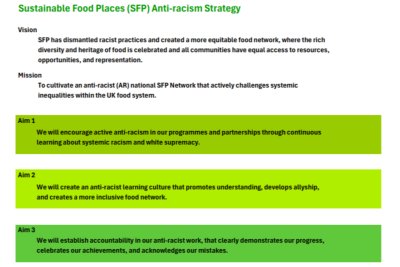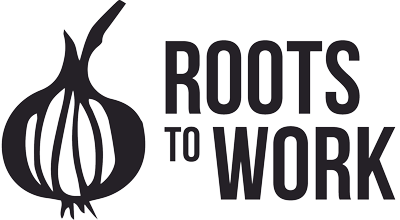
Tell us about your role
I’m a facilitator and expert in participatory development leading on Community Engagement and Participation at Food Matters. My role focuses on embedding participatory community development processes through consultancy work, practical training and organisational capacity building. I also lead on Representation and Justice at Sustainable Food Places (SFP) – a UK-wide network of 114 food partnerships tackling systemic food issues. This work includes designing peer learning programmes, advising partnerships on inclusive governance models, and leading SFP’s Representation and Justice workstream to ensure marginalised voices shape food policy.
What is the SFP Anti-Racism Strategy?
The strategy is a framework to dismantle racism in food systems by embedding anti-racist practices across SFP’s network. It builds on REDI for Change, an ethos and review tool helping organisations reflect on their culture, practices, and people through a Race, Equity, Diversity, and Inclusion (REDI) lens.

Why does it exist?
"Because racism persists in our society and food systems.”
The murder of George Floyd and #BlackLivesMatter prompted SFP’s focus on anti-racism in their food systems work. We acknowledge that food partnerships risk perpetuating inequities unless they act intentionally to address them. If food partnerships do not genuinely represent the communities where they work, marginalised groups, particularly Black and People of Colour (BPOC) are excluded from shaping a sustainable food future.
Co-created by a diverse group of people doing food systems work, this strategy confronts that reality head-on; it will transform SFP’s earlier REDI Review Tool into a mandatory framework for systemic change.
What are you hoping to achieve?
- Embed anti-racism structurally:
- Integrate the REDI Review Tool into SFP’s funding criteria and awards framework, requiring partnerships to demonstrate progress annually.
- Develop an anti-racist recruitment toolkit to reduce bias and promote equity, including anonymised shortlisting and inclusive job descriptions.
- Drive accountability:
- Establish an anti-racist accountability group to track progress through SMART KPIs (e.g., staff diversity metrics, community engagement targets).
- Create benchmarking via baseline surveys and case studies to measure gaps in representation and access to resources.
- Celebrate success:
- Showcase anti-racist practices across the network, such as the Black History Double-decker Bus in Plymouth, an initiative led by Diversity Business Incubator, a partner in Food Plymouth.
“The strategy demonstrates SFP’s commitment to active anti-racism. This isn’t optional, it’s how we ensure food systems work for everyone."
What can other organisations learn?
- Build powerful coalitions: Unite farmers, retailers, and community groups to dismantle systemic barriers. Islington Food Partnership, and their partner Choices London, champion the work of the Black Rootz project, a multigenerational growing project providing opportunities for BPOC growers in the UK whilst increasing food security and access to culturally appropriate foods.
- Audit thoroughly: Use tools like the REDI Review Tool to review and reflect on culture and practices. For example, “Who holds power in decision-making forums? How representative is your organisation? How are you communicating your commitment to active anti-racism?”
- Centre marginalised voices: Redistribute power through models like SFP’s 20-member working group (50% BPOC, 50% White affinity), which co-designed the strategy.
The SFP Anti-racism Strategy has can be accessed through the SFP Toolkit in the resources section of the SFP website.
Call to Action
What step will your organisation take first?
Start here:
- Use the REDI Review Tool to assess how power operates in your organisation and networks.
- Contribute data to the Racial Action for the Climate Emergency (RACE) Report to benchmark sector progress.
- Learn about British colonialism's impact on inequity in the UK food system by reading the Sankofa Report
“Silence perpetuates the status quo. Commit to one action today.”



